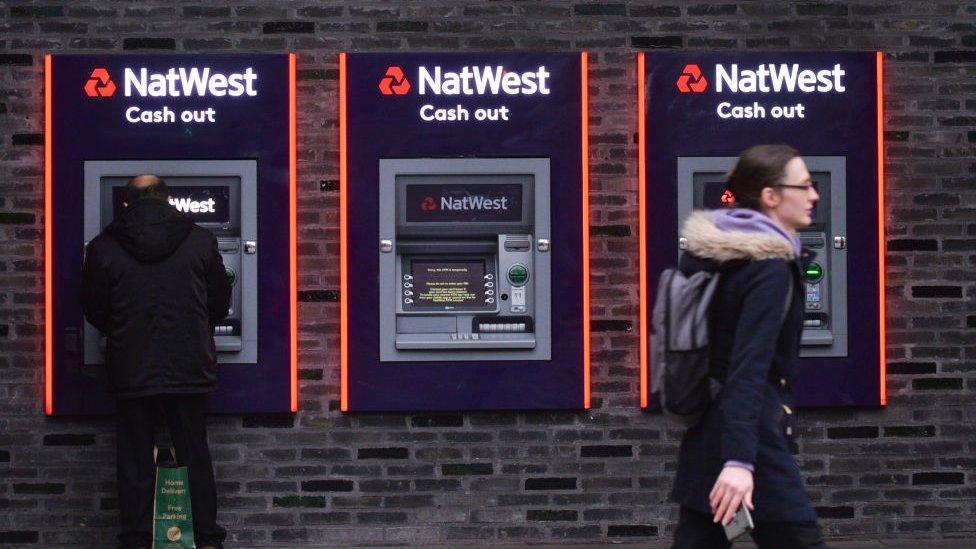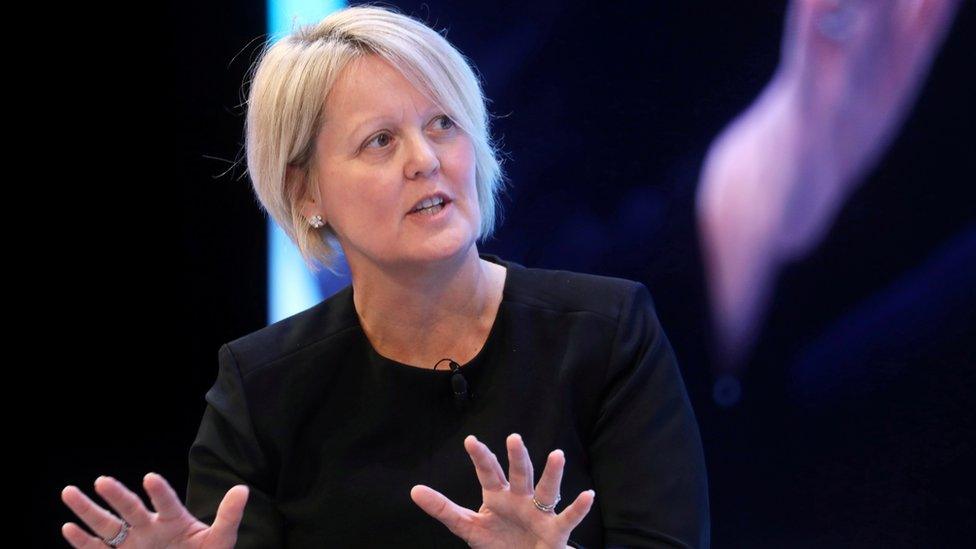Taxpayer no longer majority NatWest shareholder
- Published
- comments

The taxpayer is no longer the majority shareholder in Natwest after it sold £1.2bn worth of shares in the group.
The group, formerly known as Royal Bank of Scotland (RBS), was rescued at the height of the 2008 financial crisis with a £45bn government bailout.
Following the sale of a chunk of its shares, government ownership in Natwest is now at 48.1% - down from 50.6%.
The sale was an "important landmark" in its plan to return the bank to full private ownership, the Treasury said.
Susannah Streeter, senior investment and markets analyst, Hargreaves Lansdown said the share sale came at time when "the government sorely needs the cash with the costs of borrowing mounting".
When the financial crisis struck in 2008, the government started to build a stake in the then RBS Group which was teetering on the brink of collapse.
The initial investment, which resulted in the government owning 57% of the bank, was extended a couple of times before peaking at 84% in 2009.
Since 2015, the Treasury has been selling off its stake and the process of selling off NatWest shares is likely to continue for some time to come.
The government's remaining stake in NatWest, which fluctuates depending on the share price, is around £11bn.
It has already taken considerably longer than disposal of the public ownership of Lloyds, which was finally unwound in 2017.
Ms Streeter told the BBC the government had taken a hit on the price of NatWest's shares.
She said the government had raised about £8bn so far from its stakes sold, which represented a "huge loss" to taxpayers, given the £45bn bailout.
"It's clear that bailing out the company has come at a huge cost to the taxpayer, with the government expected to be sitting on a loss of at least £26bn," she said.
However, Ms Streeter said in the depths of the financial crisis, the bailout was "considered to be the price to pay for protecting the wider economy from severe repercussions, which at the time was feared could bring the banking system crashing down, causing even further damage to the economy".

Chief executive Alison Rose was appointed in 2019
The government was first handed shares in the banks in 2008 after announcing a huge injection of cash into the sector.
Gordon Brown, who was prime minister at the time of the crisis, said the investment was not an attempt to nationalise the banks and that the shares would be sold back "at the right time".
'Important milestone'
NatWest boss Alison Rose called the latest move an "important milestone".
Ms Rose said the deal would be a "good use of capital for the bank and our shareholders".
"Reducing government ownership below 50% is an important milestone for NatWest Group and a further demonstration of the progress we are making as we continue to deliver for our customers and shareholders," she added.
NatWest Group's main banking brands are NatWest, Royal Bank of Scotland (RBS) and Coutts. It was renamed NatWest Group in 2020 after more than 40 years under the RBS Group moniker.
The government has said previously it intends to sell £15bn worth of shares in the group by 2023. In this latest transaction, the Treasury authorised the sale of around 550 million shares.
"We will continue to prioritise delivering value for money for the taxpayer as we take forward this plan," it said.


This is a milestone in the bank's recovery and will be seen by some as a millstone removed.
The UK government's stake was at 82% for years, in the hope that its share price could recover to the breakeven price of above 500p.
As Royal Bank of Scotland, and now NatWest, it never got close. For years, there were huge losses and enormous legacy costs from legal action and redress, while it was forced by regulators to shed some of its more lucrative divisions.
In recent years, that state stake has been paying back dividends, but the share price has been weighed down by weakness in its customer base - that is, the UK economy.
Rather than selling the government stake, some have argued that the bank should be retained in state control, to support strategic industrial investment.
In any case, the £45bn bailout capital was not intended as an investment: it was the method used to keep the world's largest bank, measured by balance sheet in 2008, from collapsing and doing collateral damage to the British and world economies.
Will it make any difference that the government no longer has a majority stake? In the bank's mindset, perhaps. Private investors will be encouraged to see it returning to market disciplines.
As tranches are sold off and political oversight removed, it becomes easier for NatWest to expand from its stripped-down UK base. But it also makes it vulnerable to predators.
